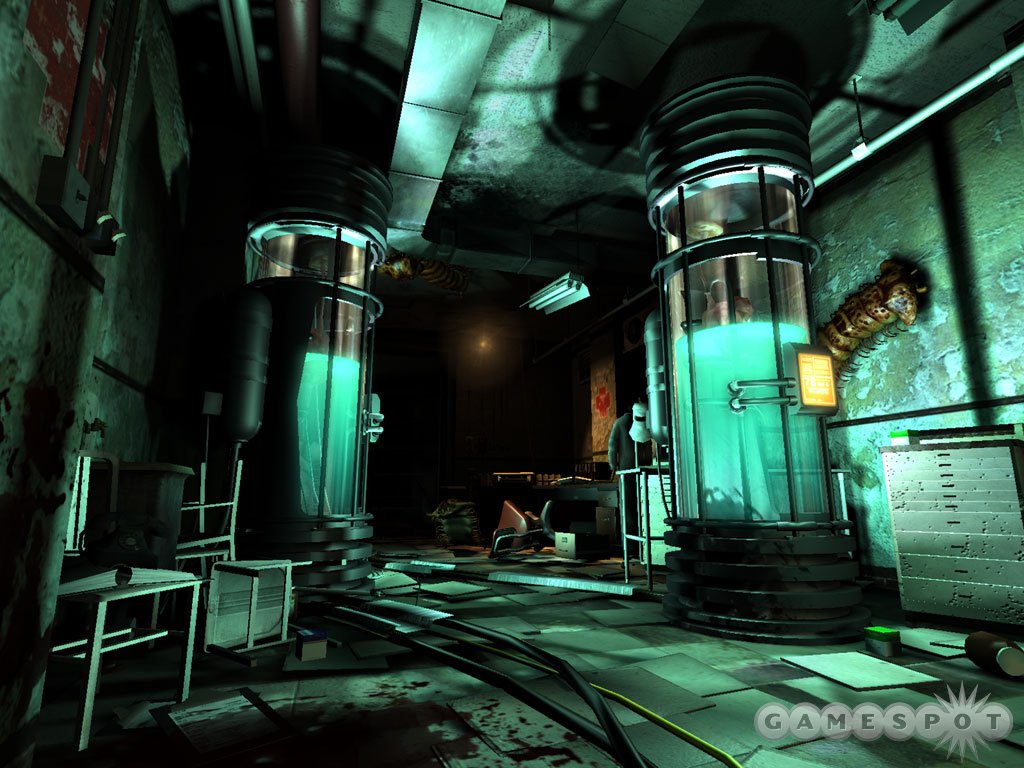BioShock First Look - Exclusive First Impressions
Take an exclusive first look at the successor to System Shock 2 from Irrational Games.
Irrational Games originally conceived of its cult-classic hybrid game System Shock 2 as a "spiritual successor" to the original game. And Irrational's next game will, in turn, be a "spiritual successor" to System Shock 2. We're pleased to bring you the first official details on BioShock, a new game that will attempt to further the open-ended, emergent gameplay of the previous games by offering even more choices for players to creatively interact with the world around them and to solve the challenges that face them.

While System Shock 2 represented what Irrational general manager Ken Levine describes as "a convergence of technology and commercialism" (that game took place on a corporate-sponsored starship), BioShock will instead represent "a convergence of technology and biological life," or more specifically, genetics. It's important to note: BioShock is not a sequel to any of the System Shock games, nor does it have any official relation to those games. But like the previous games, this one will offer a horror-themed gameplay experience in which what you observe, and what happens to you, will be tempered by your own choices. "[At Irrational], we think emergence is the future," says Levine.
BioShock takes place in a mysterious genetic laboratory. Other than that the complex is strewn with corpses (also for reasons unknown), nothing is clear to you. From what you can tell, the laboratory complex is apparently a holdover from World War II--you'll see remnants of the war as well as peeling paint throughout the complex. Something apparently happened back then that caused the complex to be abandoned by whoever was using it. In fact, the complex has only recently come back into use by the scientists circa the early 21st century, and advanced, top-secret contraptions used for arcane biotechnology experiments have been hastily bolted into the rotting walls of the complex.
You'll explore the complex from a first-person perspective, similar to System Shock 2 or Deus Ex, and you'll find it inhabited by three primary "castes" of creatures, which Irrational is currently referring to as "drones," "predators," and "soldiers"--creatures that might once have been human. We were shown a few concept images of creatures that were part human, part monster. Exactly how these creatures came to be this way isn't clear, but Irrational has suggested that some of them are actually fused with human anatomy: human lungs are grafted onto their bodies to breathe, and the human arm dangling off to the side can still hold and fire a gun.
Yet instead of being controlled individually by different kinds of artificial intelligence, these creatures apparently make up what the developer calls an "AI ecology." Essentially, Irrational decided to try to create an instinctive behavior in the creatures that inhabit the game in lieu of creating individual characters with scripted lines (because characters like these have a tendency to be misused by players in unexpected ways, and eventually they will break down). Instead, each of the three creature types is driven by overriding motivations--a concept that was inspired by, among other things, watching wildlife TV shows with animals and insects that have comprehensible, biologically intuitive, but decidedly non-human behaviors.

For whatever reason, the drones' daily routine involves roving the compound in search of corpses, which they feed on, digest, and process the dead flesh into usable, recyclable genetic material (similar to the way cows digest plant matter in their four stomachs). They then return to the complex with their harvest. Predators, which may have originally been conceived of as warriors for the mysterious scientists, have instead turned on the colony and developed a taste for drones. The extremely tough soldiers were put in place to guard drones, presumably as a response to predators.
What Kind of Research Is This, Anyway?
But as it turns out, the material that drones harvest is also the currency of the strange new world of BioShock. As such, you'll spend a good deal of the game trying to devise both direct and indirect means of acquiring harvested DNA from drones without incurring the wrath of a hungry predator or a protective soldier. This genetic material can take the form of "plasmids," which are essentially DNA implants that you can inject into your body to grant a wide array of enhanced abilities--including powers that can indirectly help you take advantage of your environment. By implanting the proper plasmids in your body, you may be able to affect your body's resistance to extreme air pressure or extreme temperatures. This ability will come in handy in the complex's climate-controlled areas, where switches that affect the area's temperature can be used to manipulate the environment. So for instance, if you're in a room full of enemies that are vulnerable to intense heat, and you have a plasmid that resists heat, you can safely turn the room's thermostat all the way up, putting your enemies at a disadvantage while you remain relatively safe. Another plasmid ability that was suggested was the ability to survive unnatural air pressure. With this plasmid, players would be able to use a pressurization switch to change the air pressure in a room to the extent that sound simply wouldn't carry as far. This would effectively give your character the ability to stealthily move with less chance of being heard, but your own hearing would also be compromised by the pressure drop as well.

However, you'll only have a limited number of "slots" for different plasmids, and in addition, you'll be able to swap out new plasmids only by using certain one-use stations scattered throughout the complex. While the system is definitely an unusual interpretation of the classic character development you might expect from a role-playing game, it's also intended to make you plan more strategically. Art director Nate Wells likens the process to the collectible card game Magic: The Gathering: "It's like having a collection of cards versus having a deck with a limit of how many you can put in," says Wells. Since you'll likely end up carrying more plasmids than you'll have slots for, your strategies will revolve around swapping in the right plasmids for the right situations. Interestingly, this new system ties into BioShock's interface, which Irrational plans to make highly streamlined. Designer Dorian Hart recalls that System Shock 2's interface was highly functional, but cluttered the screen to an almost overwhelming extent--so in some cases, the new game will show interface elements "only when you need them." For instance, while you can refer to your current set of active plasmids at any time, they won't persistently clutter up the screen except when you use these genetic modification machines.
You'll also be armed with a few technological gadgets. BioShock will have five basic weapon classes, including pistols, shotguns, and rifles. However, unlike in typical first-person shooters where you'll keep picking up new guns as you go, BioShock will instead present you with prototype hardware for each weapon class. You'll then end up finding or scrounging up additional upgrades for your weapons that you can use to turn a rifle into a sniper rifle or a simple ballistic launcher into a grenade launcher. However, you'll also need to carefully choose between using these upgrades for your weapons or using them for a biological scanning device you'll carry that can capture photos, like a camera. If you can capture exceptionally clear photos of specific creatures, you'll actually be able to expose their weaknesses. Successfully getting a high-quality picture will therefore automatically grant you a bonus in battle the next time you encounter them. Like in previous Irrational Games, you may find yourself having to make tough decisions to ration out your equipment in different areas.
Aside from the distinctive game mechanics, Irrational is making sure to leverage good technology to create the kind of atmosphere you'd expect from a horror-themed game. We were able to see a very early 3D concept space for one of the game's environments, which showed off a ruined WWII infirmary now built out with glass towers full of glowing sludge. The developer is using the Vengeance engine--the highly modified version of Unreal technology it used for the recently completed Tribes: Vengeance--to power its new game and it intends to take full advantage of DirectX 9.0 shader and lighting effects to enhance mood. A more obvious feature in BioShock that will add to its atmosphere is its creatures: they're partially human, or once were, but have been changed almost beyond recognition. Almost. Levine hints that the new game may feature the same kind of dramatic ambiguity seen in System Shock 2 and the motion picture Fight Club. Like in those other sources of inspiration, in BioShock, you may meet characters and have firsthand experiences early on that you'll come to doubt later. You may even begin to wonder whether you had actually seen what you thought you did--or whether your mind was playing tricks on you.
BioShock has been in design for some three years now, but at this time, the developer has completed Tribes: Vengeance and is nearly done with its other project, Freedom Force vs. the Third Reich. Stay tuned for more updates on this intriguing game.
Got a news tip or want to contact us directly? Email news@gamespot.com
Join the conversation